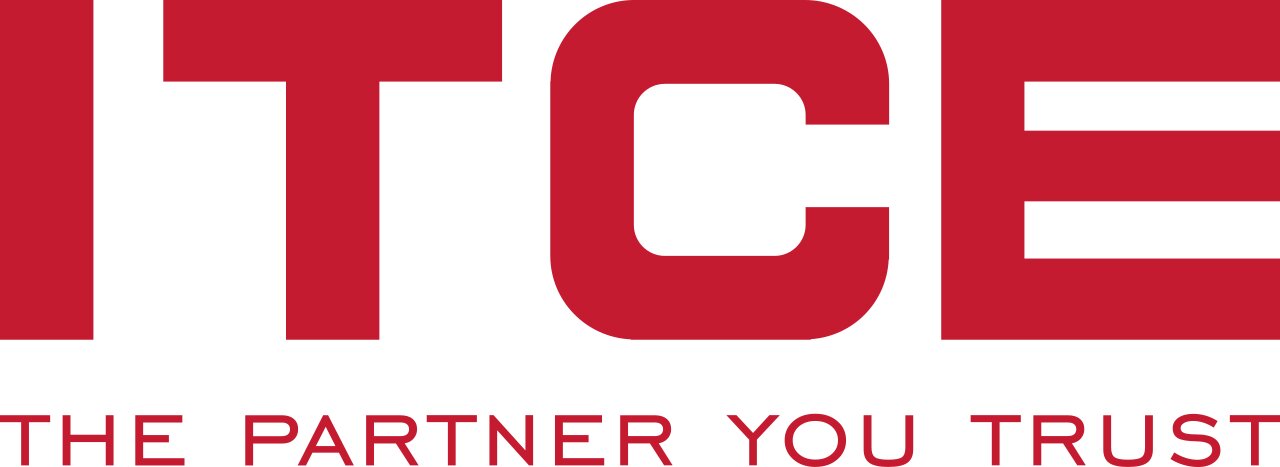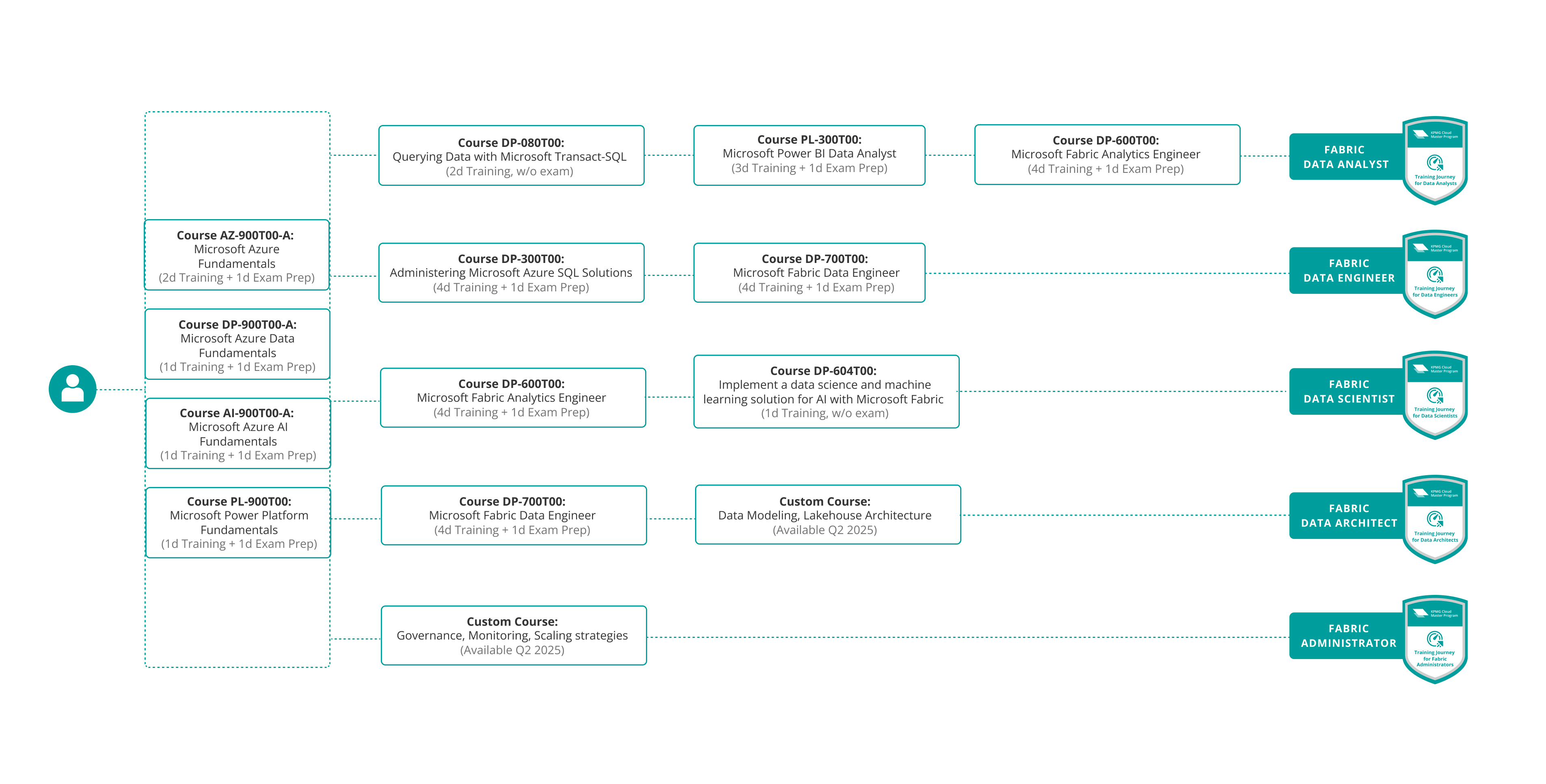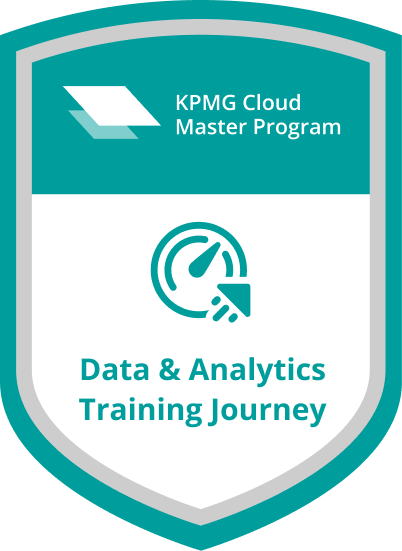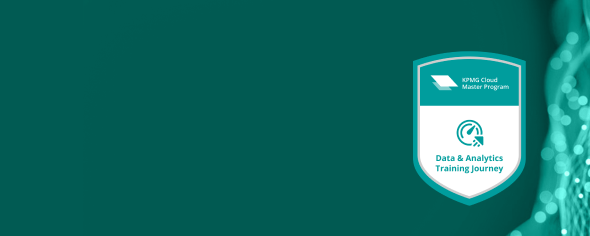In cooperation with


Unlock the power of data and help yourself excel in your consultant role with our Data & Analytics Training Journey! Whether you’re an aspiring Data Analyst, Data Engineer, or Data Scientist, this structured learning path will equip you with the skills and certifications needed to thrive in the world of Microsoft Fabric and beyond.
Data & Analytics Training Journey
- Begin with the Basics – Lay a strong foundation with essential courses like AZ-900, DP-900, and AI-900, giving you a solid grasp of cloud, data, and AI fundamentals.
- Advance Your Expertise – Master in-demand tools and techniques with specialized courses like PL-300 (Power BI), DP-600 (Data Engineering), DP-700 (Data Science), and more.
- Get Certified & Stand Out – Each course prepares you for official Microsoft certifications, setting you apart in the job market and proving your expertise.
- Hands-on Learning & Real-World Skills – Learn through practical labs, real-world case studies, and expert-led sessions that bridge the gap between theory and application.
Whether you’re just starting out or looking to level up, this journey will empower you to turn data into insights, drive innovation, and enhance your consulting capabilities.

Program contents
Course: AZ-900 Microsoft Azure Fundamentals
(Instructor-led online delivery – 2 days)
Find full course outline
here.
This course is suitable for IT personnel who are just
beginning to work with Azure. This audience wants to learn
about our offerings and get hands-on experience with the
product. This course primarily uses the Azure portal and
command line interface to create resources and does not
require scripting skills. Students in this course will gain
confidence to take other role-based courses and
certifications, such as Azure Administrator. This course
combines lecture, demonstrations, and hands-on labs. This
course will also help prepare someone for the AZ-900 exam.
+ Exam Preparation and Q&A Session (1 day)
+ AZ-900 Certification Exam
Delivery formats:
Online instructor-led
Self-paced
Course: DP-900: Microsoft Azure Data Fundamentals
(Instructor-led online delivery – 1 day)
Find full course outline
here
In this course, students will gain foundational knowledge of
core data concepts and related Microsoft Azure data
services. Students will learn about core data concepts such
as relational, non-relational, big data, and analytics, and
build their foundational knowledge of cloud data services
within Microsoft Azure. Students will explore fundamental
relational data concepts and relational database services in
Azure. They will explore Azure storage for non-relational
data and the fundamentals of Azure Cosmos DB. Students will
learn about large-scale data warehousing, real-time
analytics, and data visualization.
This course is suitable for individuals who want to learn
the fundamentals of database concepts in a cloud
environment, get basic skilling in cloud data services, and
build their foundational knowledge of cloud data services
within Microsoft Azure.
+ Exam Preparation and Q&A Session (1 day)
+ DP-900 Certification Exam
Delivery formats:
Online instructor-led
Self-paced
Course: AI-900: Microsoft Azure AI Fundamentals
(Instructor-led online delivery – 1 day)
Find full course outline
here
This course introduces fundamentals concepts related to
artificial intelligence (AI), and the services in Microsoft
Azure that can be used to create AI solutions. The course is
not designed to teach students to become professional data
scientists or software developers, but rather to build
awareness of common AI workloads and the ability to identify
Azure services to support them. The course is designed as a
blended learning experience that combines instructor-led
training with online materials on the Microsoft Learn
platform (https://azure.com/learn). The hands-on exercises in the course are based on Learn
modules, and students are encouraged to use the content on
Learn as reference materials to reinforce what they learn in
the class and to explore topics in more depth.
The Azure AI Fundamentals course is designed for anyone
interested in learning about the types of solution
artificial intelligence (AI) makes possible, and the
services on Microsoft Azure that you can use to create them.
You don’t need to have any experience of using Microsoft
Azure before taking this course, but a basic level of
familiarity with computer technology and the Internet is
assumed. Some of the concepts covered in the course require
a basic understanding of mathematics, such as the ability to
interpret charts. The course includes hands-on activities
that involve working with data and running code, so a
knowledge of fundamental programming principles will be
helpful.
+ Exam Preparation and Q&A Session (1 day)
+ AI-900 Certification Exam
Delivery formats:
Online instructor-led
Self-paced
Course: PL-900: Microsoft Power Platform Fundamentals
(Instructor-led online delivery – 1 day)
Find full course outline
here
Learn the business value and product capabilities of
Microsoft Power Platform. Create simple Power Apps, connect
data with Dataverse, build a Power BI Dashboard, and
automate processes with Power Automate.
This course is suitable for users who aspire to improve
productivity by automating business processes, analyzing
data to produce business insights, and acting more
effectively by creating simple app experiences.
+ Exam Preparation and Q&A Session (1 day)
+ PL-900 Certification Exam
Delivery formats:
Online instructor-led
Self-paced
Course: DP-080: Querying Data with Microsoft Transact-SQL
(Instructor-led online delivery – 2 days)
Find full course outline
here
This course will teach the basics of Microsoft's dialect of
the standard SQL language: Transact-SQL. Topics include both
querying and modifying data in relational databases that are
hosted in Microsoft SQL Server-based database systems,
including: Microsoft SQL Server, Azure SQL Database and,
Azure Synapse Analytics.
This course can be valuable for anyone who needs to write
basic SQL or Transact-SQL queries. This includes anyone
working with data as a data analyst, a data engineer, a data
scientist, a database administrator or a database developer.
It can also be useful for others peripherally involved with
data, or wanting to learn more about working with data such
as solution architects, students and technology managers.
This course has no corresponding certification exam.
Delivery formats:
Online instructor-led
Self-paced
Course: PL-300: Microsoft Power BI Data Analyst
(Instructor-led online delivery – 3 days)
Find full course outline
here
This course covers the various methods and best practices
that are in line with business and technical requirements
for modeling, visualizing, and analyzing data with Power BI.
The course will show how to access and process data from a
range of data sources including both relational and
non-relational sources. Finally, this course will also
discuss how to manage and deploy reports and dashboards for
sharing and content distribution.
The audience for this course are data
professionals and business intelligence professionals who
want to learn how to accurately perform data analysis using
Power BI. This course is also targeted toward those
individuals who develop reports that visualize data from the
data platform technologies that exist on both in the cloud
and on-premises.
+ Exam Preparation and Q&A Session (1 day)
+ PL-300 Certification Exam
Delivery formats:
Online instructor-led
Self-paced
Course: DP-300: Administering Microsoft Azure SQL
Solutions (Instructor-led online delivery – 3 days)
Find full course outline
here
This course provides students with the knowledge and skills
to administer a SQL Server database infrastructure for
cloud, on-premises and hybrid relational databases and who
work with the Microsoft PaaS relational database offerings.
Additionally, it will be of use to individuals who develop
applications that deliver content from SQL-based relational
databases.
The audience for this course is data
professionals managing data and databases who want to learn
about administering the data platform technologies that are
available on Microsoft Azure. This course is also valuable
for data architects and application developers who need to
understand what technologies are available for the data
platform with Azure and how to work with those technologies
through applications.
+ Exam Preparation and Q&A Session (1 day)
+ DP-300 Certification Exam
Delivery formats:
Online instructor-led
Self-paced
Course: DP-700: Microsoft Fabric Data Engineer
(Instructor-led online delivery – 4 days)
Find full course outline
here
This course covers methods and practices to implement data
engineering solutions by using Microsoft Fabric. Students
will learn how to design and develop effective data loading
patterns, data architectures, and orchestration processes.
Objectives for this course include ingesting and
transforming data and securing, managing, and monitoring
data engineering solutions. This course is designed for
experienced data professionals skilled at data integration
and orchestration, such as those with the DP-203: Azure Data
Engineer certification.
This audience for this course is data
professionals with experience in data extraction,
transformation, and loading. DP-700 is designed for
professionals who need to create and deploy data engineering
solutions using Microsoft Fabric for enterprise-scale data
analytics. Learners should also have experience at
manipulating and transforming data with one of the following
programming languages: Structured Query Language (SQL),
PySpark, or Kusto Query Language (KQL).
+ Exam Preparation and Q&A Session (1 day)
+ DP-700 Certification Exam
Delivery formats:
Online instructor-led
Self-paced
Course: DP-600: Microsoft Fabric Analytics Engineer
(Instructor-led online delivery – 4 days)
Find full course outline
here
This course covers methods and practices for implementing
and managing enterprise-scale data analytics solutions using
Microsoft Fabric. Students will learn how to use Fabric
dataflows, pipelines, and notebooks to develop analytics
assets such as semantic models, data warehouses, and
lakehouses. This course is designed for experienced data
professionals skilled at data preparation, modeling,
analysis, and visualization, such as the PL-300: Power BI
Data Analyst certification.
DP-600 is designed for professionals who want to
use Microsoft Fabric to create and deploy enterprise-scale
data analytics solutions. Learners should have prior
experience with one of the following programming languages:
Structured Query Language (SQL), Kusto Query Language (KQL),
or Data Analysis Expressions (DAX).
+ Exam Preparation and Q&A Session (1 day)
+ DP-600 Certification Exam
Delivery formats:
Online instructor-led
Self-paced
Course: DP-604T00: Implement a data science and machine
learning solution for AI with Microsoft Fabric
(Instructor-led online delivery – 1 days)
Find full course outline
here
Explore the data science process and learn how to train
machine learning models to accomplish artificial
intelligence in Microsoft Fabric. This course introduces
data preparation with Data Wrangler, building and tracking
models with MLflow, and deploying end-to-end ML solutions.
It's ideal for data professionals looking to work with AI in
the Microsoft ecosystem.
This course has no corresponding certification exam.
Delivery formats:
Online instructor-led
Self-paced
Certifications and Badges

Our Trainers
Program Details
At the registration point you can choose from a drop-down menu between calendar dates for training with a trainer or a self-paced learning for some or all of the courses.

